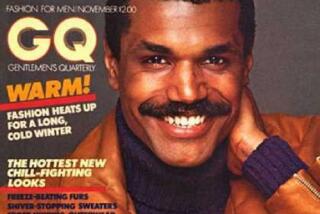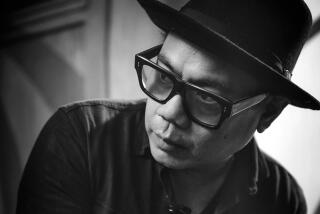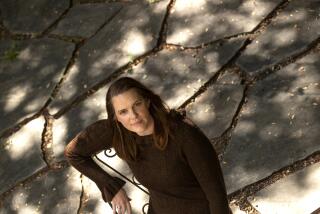Art Cooper, 65; Editor Who Transformed GQ Magazine
- Share via
Art Cooper, the longtime editor-in-chief of GQ who transformed what had been a small men’s fashion magazine into an award-winning general-interest publication, has died. He was 65.
Cooper, who announced his retirement from Gentlemen’s Quarterly in February and left the magazine at the end of April, died Monday in a New York hospital after suffering a stroke Thursday while having lunch at the Four Seasons restaurant, his favorite Manhattan haunt.
The current issue of GQ was Cooper’s last as editor-in-chief. Executive editor Jim Nelson succeeded him.
“Art was this unique combination of masculine elegance and joyous bombast, for a lack of a better way of putting it,” said Robert Draper, a GQ writer-at-large. “He had this great, elemental, almost Zeus-like voice, and he reveled in a big life.”
Cooper, who had been editor of Penthouse magazine and Family Weekly before becoming editor-in-chief at Gentlemen’s Quarterly in 1983, dramatically changed the content of the magazine, which was founded in 1957.
Before Cooper’s arrival, GQ was strictly a monthly men’s fashion magazine with a primarily gay readership.
Cooper boldly announced the magazine’s change with the first cover under his leadership and began offering a mix of not only fashion and style coverage, but fiction, political profiles, investigative reports, first-person articles, sports and other coverage.
Indeed, GQ quickly earned a reputation for its journalism and stylish writing. Cooper recruited columnists such as Mordecai Richler, Wilfrid Sheed, Ron Powers and Michael K. Evans and acclaimed journalists such as David Halberstam, Peter Mayle, Garry Wills and Dan Wakefield.
Among the magazine’s memorable pairings between writers and subjects were novelist William Kennedy’s interview with New York Gov. Mario Cuomo, Gore Vidal’s essay on the Clinton-Gore presidential ticket and John Mortimer’s reflections on Prince Charles.
Cooper also worked with many of the top magazine writers, including Tom Junod, Michael Kelly, Gay Talese, James Ellroy, Alan Richman, Michael Paterniti and Elizabeth Gilbert.
“Art’s two great loves professionally were style and fashion -- that being one. The other was great journalism,” said David Granger, editor-in-chief of Esquire magazine, who worked with Cooper for 5 1/2 years in the ‘90s as GQ’s executive editor.
“What Art did is he took the fashion foundation that was GQ and he layered on what he thought was the greatest magazine ever, which was Esquire in the ‘60s. He made this sort of really effective hybrid of fashion and general interest that really became a force by ‘85, ‘86, ’87.”
In 1985, Cooper was named Editor of the Year by Adweek magazine, the first Conde Nast editor to be so honored.
Cooper also changed the way men’s fashion was covered. Under his leadership, GQ became the “the final word in what defines the sophisticated man, and has been for 20 years,” said GQ senior writer Andrew Corsello.
Cooper, Corsello said, “was responsible for the culture’s internalization of GQ into the vernacular.
“People say, ‘Oh, he’s so GQ. He’s so GQ smooth.’ Cooper’s completely responsible for that. He brought an understanding of what it is to be a man to a large segment of the culture, and you can debate what that is, but he represents one side of the argument.”
Under Cooper’s editorial leadership, GQ received 27 National Magazine Award nominations from the American Society of Magazine Editors and won three of the prestigious awards, known as Ellies.
Circulation also went up dramatically during his tenure from 565,000 to more than 850,000, and advertising increased as well.
“We have seen a lot of editors who’ve taken a pretty good magazine and dumbed it down, but I don’t think we’ll ever see again an editor who took a not-so-smart magazine and made it brilliant,” Draper said.
Born in New York City on Oct. 15, 1937, Cooper earned a bachelor’s degree from Pennsylvania State University in 1959.
He began his career in 1964 as a political reporter for the Patriot-News in Harrisburg, Pa. He was a correspondent for Time magazine before working as an associate editor and cultural critic at Newsweek from 1967 to 1976.
He became editor of Penthouse in 1976 and served as editor of Family Weekly from 1978 to 1983.
Cooper’s surprise announcement in February that he planned to retire after 20 years at GQ came just weeks after his induction into the American Society of Magazine Editors’ Hall of Fame.
At the January induction at the Waldorf-Astoria Hotel in New York City, Cooper called the honor “a tribute to the millions of fearless magazine readers for whom an article longer than 500 words is not regarded as an impending colonoscopy.”
In his final “Letter from the Editor” in the current GQ, Cooper wrote that at the end of the workday he would usually put a Frank Sinatra CD on his stereo, and editors and writers would gather in his office, “sometimes over cocktails,” to discuss the day’s events.
“Frank Sinatra has been an integral part of GQ during the two decades I’ve been its editor,” he wrote. “In the early ‘80s, we tried to capture in our pages his brash, insouciant style and the elegance with which he crooned a lyric.”
Cooper is survived by his wife, Amy, a former editor-in-chief of Mademoiselle.






